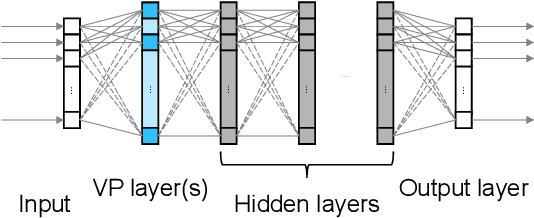VPNet: Variable Projection Networks
Paper and Code
Jun 28, 2020


In this paper, we introduce VPNet, a novel model-driven neural network architecture based on variable projections (VP). The application of VP operators in neural networks implies learnable features, interpretable parameters, and compact network structures. This paper discusses the motivation and mathematical background of VPNet as well as experiments. The concept was evaluated in the context of signal processing. We performed classification tasks on a synthetic dataset, and real electrocardiogram (ECG) signals. Compared to fully-connected and 1D convolutional networks, VPNet features fast learning ability and good accuracy at a low computational cost in both of the training and inference. Based on the promising results and mentioned advantages, we expect broader impact in signal processing, including classification, regression, and even clustering problems.
 Add to Chrome
Add to Chrome Add to Firefox
Add to Firefox Add to Edge
Add to Edge